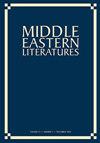Aḥmad al-Madīnī: a poetics of dissent
IF 0.2
4区 文学
0 LITERATURE
引用次数: 0
Abstract
ABSTRACT This article argues that the subversive overtones in Aḥmad al-Madīnī's novel Zaman bayna l-wilāda wa l-ḥulm (Time between Birth and Dream, 1974) target two distinct poles of authority, textual and extra-textual. The novel adopts what I call “a poetics of dissent,” with a penchant for rebellion against the classical Arabic novel-seen as a subset of the European realist novel-and the Arab-Moslem heritage. Published a few years after the 1967 Naksa, and two failed coups d'état in 1971 and 1972 in Morocco, the novel paints a gloomy picture of life in Morocco and the Arab world. The novel's experimental gymnastics is an attempt to achieve a formal shift in literary technique and an ideological shift in the politics of literary representation. A politization of form that goes hand in hand with a formalization of politics emerges as a critical dialectic in Zaman and by extension Moroccan experimental literature post-Independence.Aḥmad al- madī n ā:异议的诗学
摘要:本文认为,Aḥmad al- mad尼的小说《出生与梦想之间的时间》(1974)的颠覆性暗示直指两个截然不同的权威极点,即文本和文本外的两极。这部小说采用了我所说的“异议诗学”,对古典阿拉伯小说(被视为欧洲现实主义小说的一个子集)和阿拉伯-穆斯林传统的反叛倾向。这本小说出版于1967年纳克萨政变和1971年和1972年两次未遂的摩洛哥政变之后几年,描绘了摩洛哥和阿拉伯世界的一幅阴郁的生活图景。小说的实验体操是文学手法形式上的转变和文学表现政治上的意识形态转变的一种尝试。形式的政治化与政治的形式化齐头并进,作为一种批判性的辩证法出现在扎曼,并延伸到独立后的摩洛哥实验文学。
本文章由计算机程序翻译,如有差异,请以英文原文为准。
求助全文
约1分钟内获得全文
求助全文

 求助内容:
求助内容: 应助结果提醒方式:
应助结果提醒方式:


